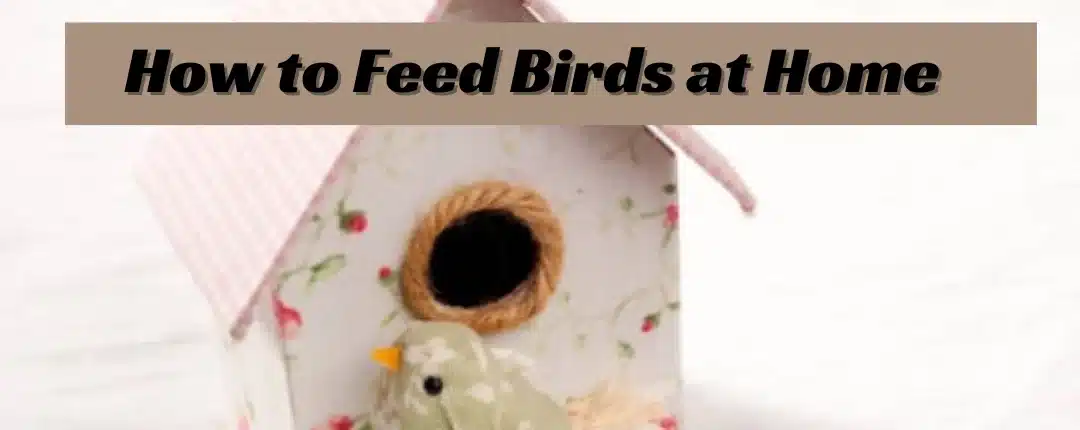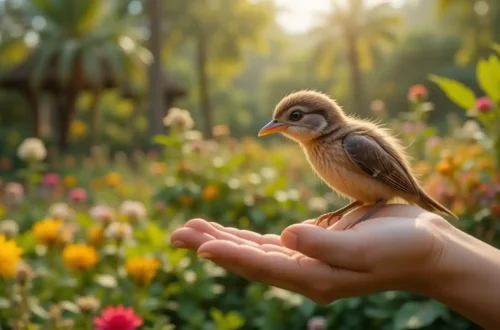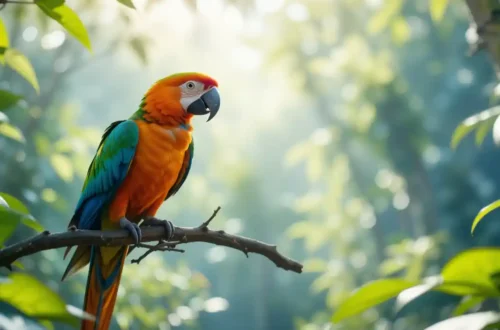Looking out your window to see colorful, lively birds visiting your yard is a delight. You can attract wild birds by feeding them around your home with the proper techniques. Setting up bird feeders and creating an inviting space will bring vibrance to your outdoor area throughout the seasons. Feeding birds can be simple and inexpensive, too. You can enjoy a flourishing bird habitat outside your door with simple equipment and available food supplies at any pet store or garden center.
This article provides beginner-friendly tips to feed birds in your backyard or garden successfully. You’ll learn the best feeder types, dietary needs, placement, and maintenance to draw hungry, happy birds into your space.
The Basics of Bird Nutrition: Essence of a Balanced Diet for Birds

Birds, much like humans, thrive on a balanced diet. Providing a variety of seeds, fruits, and insects ensures they receive the essential nutrients for optimal health. Sunflower seeds, millet, and suet are popular choices that cater to different bird species. By offering a diverse menu, you cater to the varied tastes of our avian companions.
Importance of Fresh Water Sources
Water is a fundamental element for bird well-being. Integrating birdbaths or small water features in your backyard can attract many bird species. Ensure the water is fresh and clean, changing it regularly to prevent the spread of diseases. This small effort can significantly impact the health and happiness of your feathered visitors.
Creating Bird-Friendly Feeding Stations
Designing an inviting feeding station is an art in itself. Opt for bird feeders that are clean and easy to access. Strategically place them in different areas of your garden to cater to the diverse preferences of various bird species. This creates a welcoming atmosphere, encouraging birds to explore and linger in your outdoor space.
Observing Feeding Habits for Personalized Care
Each bird species has unique feeding habits. You are observing the birds in your area to tailor your feeding approach. Some birds prefer ground feeding, while others are adept at perching on feeders. Understanding these nuances allows you to accommodate their needs better, enhancing the overall bird-feeding experience.
Crafting DIY Bird Feeders: A Creative Approach
Consider crafting your bird feeders for a personalized touch to your bird-feeding endeavors. Use simple materials like recycled bottles, wood, or kitchen scraps to create unique feeding stations. Engaging in these DIY projects not only benefits the birds but also adds a touch of creativity to your outdoor space.
The Right DIY Feeder for Your Garden
Different birds are attracted to different feeder designs. Tube, platform, and suet feeders each cater to specific bird species. Understanding birds’ preferences in your area allows you to choose or craft feeders that best suit their feeding habits, enhancing the overall bird-watching experience.
Read more about: finviz.blog
Incorporating Eco-Friendly Materials
As environmental consciousness grows, so does the importance of using eco-friendly materials. Opt for sustainable materials that minimize your ecological footprint when crafting DIY feeders. This benefits the environment and aligns with the broader goal of creating a harmonious space for humans and wildlife.
The Joy of Feeder Placement: A Strategic Approach
Where you place your feeders can influence bird traffic in your backyard. Consider placing them near natural perches, such as trees or shrubs, to provide birds with security. Additionally, positioning feeders near windows allows you to enjoy close-up views of your feathered visitors without disturbing them.
Bird Watching Cultivating Patience and Appreciation
Bird watching is a skill that requires patience and appreciation for the avian world. Set aside dedicated time to observe the birds in your garden, equipped with binoculars and a field guide. This mindful activity deepens your connection with nature and offers a peaceful retreat from the hustle and bustle of daily life.
Identifying Common Bird Species
Invest in a reputable field guide to help identify the diverse bird species that may visit your backyard. Learning about their habits, colors, and distinctive markings adds another layer of enjoyment to your bird-watching experience. Soon, you’ll be able to recognise regular visitors and newcomers with ease.
Documenting Your Avian Guests
Keep a bird journal to record your observations and sightings. Note the types of birds, their behaviours, and any unique interactions you witness. This creates a valuable personal archive and contributes to citizen science efforts, helping researchers understand bird populations and behaviors.
Experts for a Bird-Friendly Garden Consultation
For those eager to take their bird-friendly garden to the next level, consider consulting with local birding experts. They can provide insights into the specific birds in your region, offer guidance on creating a more inviting space, and share tips for attracting rare or elusive species.
Final Thoughts
Transforming your backyard into a bird haven is a delightful and rewarding endeavour. By implementing the proper techniques, such as setting up bird feeders, providing a balanced diet, and creating an inviting space, you can easily attract vibrant birdlife to your home.
Embracing the joy of bird watching and documenting your avian guests adds a personal touch to this experience. Follow these beginner-friendly tips on how to feed birds at home, and watch as your outdoor space becomes a flourishing habitat for happy, feathered visitors.






